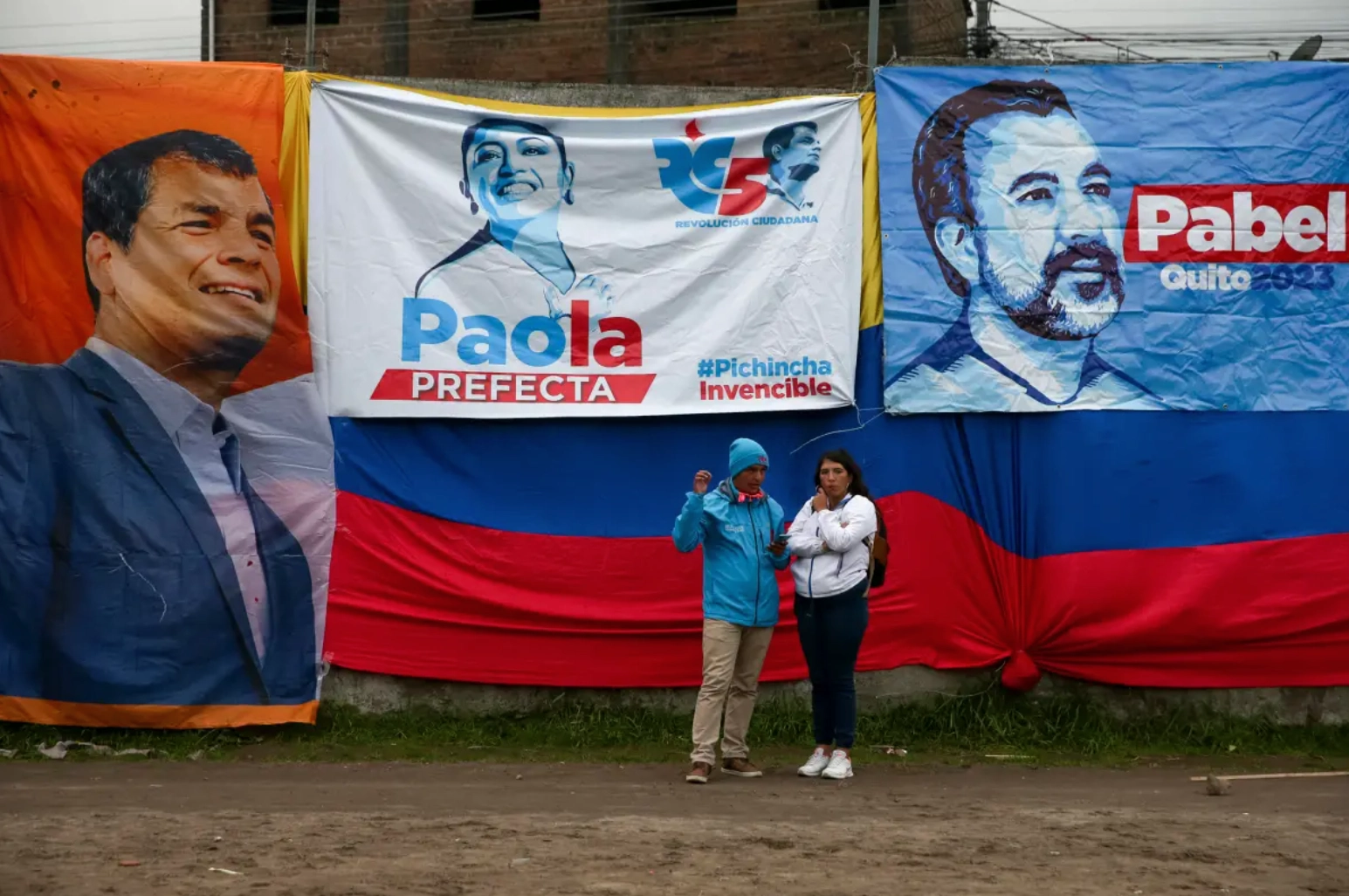In Ecuador, the competition for the Presidency began after the reciprocal dissolution decree of May 17, 2023. The measure, issued by President Guillermo Lasso, anticipates the elections to complete the current term of the presidential binomial and legislative positions. In order to repeat the luck in the municipal elections, capitalize the subnational vote and replicate the results in these national elections, the organization of former president Rafael Correa, the first political force in the country, is betting on electoral loyalty and, between the lines, on a worrying sacralization of politics.
In these elections, the Citizen Revolution launched a strategy that seeks, according to its spokespersons, to resignify the main disqualification attributed to its militants by a part of the public opinion and to change it in favor of its campaign. For this purpose, they use images created by artificial intelligence, in which small lambs can be seen humanized as if they were children. It seems that the maneuver consists of appealing to the viewers’ affection through the exhibition of baby lambs in typically human activities such as studying or working. Ecuador’s electoral law prohibits employing children in electoral campaigns, precisely to avoid the appearance of children in proselytism pieces. What does this publicity maneuver entail?
Correa’s spokespersons have explained that, after being labeled as sheep, the use of this image as an emblem of their campaign is an act of resignification, a creative process of appropriation, an identity reinvention. However, the publicity stunt, it seems, hides the recognition of the sacralization of politics as an instrument of public action.
One of the most influential historians of the sacralization of politics in the world is Emilio Gentile, professor emeritus at the Sapienza University of Rome. In “Political religion: a concept and its critics–a critical survey”, Gentile explains that the sacralization of politics is a process that belongs to modern society, whereby the political dimension acquires a religious character and becomes the mother of new belief systems and myths.
Political religion is a contemporary phenomenon that represents the pinnacle of the rebellion against the religion of the biblical god, which humanism began and which aimed to sacralize man, but which ended in the dehumanization of man by sacralizing the state, the nation, and the race, Gentile asserts.
In “The Sacralisation of politics: Definitions, interpretations and reflections on the question of secular religion and totalitarianism“, Gentile, in company with Robert Mallett, adds that the sacralization of politics is an important aspect of the different totalitarianism during the interwar period. In fact, it is generally accepted that one of the most defining, if not the most dangerous, aspects of the totalitarian phenomenon was the sacralization of politics, also known as political religion, secular religion, political mysticism, and idolatry.
This occurs when, in a more or less complex and dogmatic manner, a political movement grants a messianic status to an earthly entity that may be the fatherland, the state, humanity, t race, proletariat, or the revolution, and turns it into an unquestionable principle of collective existence, while considering it the primary source of values for individual and collective behavior.
Gentile and Mallett assert that revolutionary ideologies, messianic politics, theology, and secular eschatological theories such as Hegelianism, Marxism, and the new religions contributed significantly to the sacralization of politics during the 19th century. From this moment on, politics was plagued by prophets, apostles, and martyrs of these new secular religions that elevated humanity, History, nation, revolution, and society, to the altars of the absurd.
Moreover, Gentile states in “Fascism as political religion” that there is no definitive separation between religion and politics in the contemporary secularization of the state. The “sacralization of politics” was notoriously influenced by Nazism, Fascism, and Romantic nationalism. Even democracy, socialism, and Communism also contributed to the rise of new secular cults, although their tendency reached its peak during the totalitarian movements of the 20th century.
This is what is most suggestive of the publicity maneuver of appropriating sheep as a campaign symbol: that behind the supposed belonging to a flock is the recognition of the dominant presence of an actor who figures as a shepherd, and that above the political organization there is a leader with messianic qualities.
Beyond its more general demagogic aspects, the “cult of the leader” emerged within the confines of the “fascist religion” and, as such, was the result of that. Just as the charismatic figure of the Pope cannot be extrapolated from the Catholic Church, the charismatic figure of the fascist leader is inextricably linked to the whole structure of its symbolic universe, says Gentile.
In “Fascism, totalitarianism and political religion: definitions and critical reflections on criticism of an interpretation”, Gentile catalogs fascism as a modern, nationalist, revolutionary, illiberal, and anti-Marxist phenomenon that has been elaborated on an innovative redefinition of the concepts of totalitarianism and political religion.
In the Sapienza professor’s terms, “Fascism did not have a historical individuality of its own in the same way as liberalism, democracy, socialism or communism. Instead, it was a kind of anti-historical and anti-modern epiphenomenon without culture or ideology.” He adds that everywhere fascism was a movement to “subjugate and divert the innocent and recalcitrant masses.”
The nationalist, revolutionary, illiberal, and anti-progressive elements place some of the Latin American personalist organizations in the antithesis of progressivism. And the most worrying issue is that it faithfully follows Gentile’s diagnosis as an anti-modern phenomenon, devoid of ideological substance.
Although hardly any of the Latin American personalist phenomena reaches the conceptual proportions of Fascism, it is undeniable that the mixture of nationalism, personalism, and populism has worrying totalitarian hints.
*Translated from Spanish by Janaína Ruviaro da Silva
Autor
Political scientist and lawyer. Professor at University of the Americas (Quito). Master in Political Science and Government from FLACSO-Ecuador.











